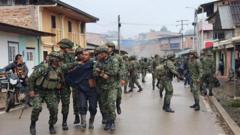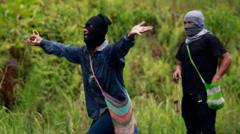In a swift and coordinated action, Brazilian police have successfully thwarted a bomb attack intended for Lady Gaga’s concert held on Copacabana Beach in Rio de Janeiro on Saturday. The Civil Police, in collaboration with the justice ministry, apprehended two suspects, including the alleged mastermind and a teenager, who allegedly orchestrated the attack to gain social media notoriety. The concert drew an impressive crowd of over two million attendees, all congregating for the free event.
Brazilian Authorities Prevent Bombing at Lady Gaga Concert

Brazilian Authorities Prevent Bombing at Lady Gaga Concert
Security forces in Brazil foil a plan for an explosive attack during a high-profile concert on Copacabana Beach.
The detained individuals were linked to a group disseminating hate speech primarily targeting children, teenagers, and the LGBTQIA+ community. The supposed leader was arrested for illegal firearm possession in Rio Grande do Sul, while the teenager faced charges of storing child pornography in Rio. Authorities expressed concern over the radicalization of youths, with evidence indicating incitement to self-harm and violence as a means of belonging to the group they identified as "Little Monsters," a fan base for Lady Gaga.
Law enforcement executed search warrants in Rio de Janeiro, Mato Grosso, Rio Grande do Sul, and São Paulo, leading to the seizure of various electronic devices and incriminating materials. The operation, dubbed "Operation Fake Monster," emerged from intelligence reports highlighting online forums that encouraged violence amongst teenagers through coded language and extremist symbols.
To ensure public safety, the concert, aimed at revitalizing Rio’s economy with potential revenues of $100 million (£75 million), featured a robust security apparatus comprising 5,000 officers. Attendees underwent a rigorous screening process, including metal detectors, in addition to surveillance through drones and facial recognition technology.
In light of these developments, the concert proceeded with enhanced security measures, allowing fans to enjoy performances while maintaining safety amidst the thwarted threat.
Law enforcement executed search warrants in Rio de Janeiro, Mato Grosso, Rio Grande do Sul, and São Paulo, leading to the seizure of various electronic devices and incriminating materials. The operation, dubbed "Operation Fake Monster," emerged from intelligence reports highlighting online forums that encouraged violence amongst teenagers through coded language and extremist symbols.
To ensure public safety, the concert, aimed at revitalizing Rio’s economy with potential revenues of $100 million (£75 million), featured a robust security apparatus comprising 5,000 officers. Attendees underwent a rigorous screening process, including metal detectors, in addition to surveillance through drones and facial recognition technology.
In light of these developments, the concert proceeded with enhanced security measures, allowing fans to enjoy performances while maintaining safety amidst the thwarted threat.





















